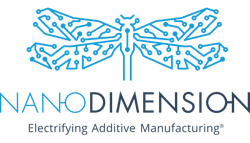Nano Dimension Fires CEO Amid Struggles in Additive Manufacturing Space
Nano Dimension abruptly fired CEO Yoav Stern late Thursday, ending his five-year stewardship, as the company and the broader additive manufacturing space struggled to find profits and growth in 2024.
Julien Lederman, who has served as vice president of corporate development since 2021, will take over as interim CEO as Nano Dimension searches for a permanent replacement. In a statement, the company’s board of directors said it has confidence in Lederman but said nothing about Stern or its reasons for dropping him from the board early this month and firing him on Thursday.
Stern took control at Nano Dimension in early 2020 and was one of the key players in the 2022-2023 attempted mergers saga that had industrial 3D printer makers Stratasys, Desktop Metal, 3D Systems and Nano Dimension all trying to buy one another in various combinations. After more than a year of wheeling an dealing, none of the mergers succeeded. Throughout that time span, none of the major players in the space were profitable, and they continued to lose money in 2024.
More Troulbe in Additive
Nano Dimension's struggles aren't happening in a vacuum. The entire additive space has been struggling for the past few years with printer maker Nexa3D announcing last week that it would shut down (via Plastics Machinery & Manufacturing).
In July, Nano Dimension offered to buy Desktop Metal for as little as $135 million, less than one-tenth the $1.8 billion that Stratasys had offered for Desktop Metal in 2023. That deal has cleared most regulatory hurdles and won shareholder approvals, but Nano Dimension hasn’t completed the purchase. When announcing the deal, the companies said they expected to merge by the end of 2024.
Last week, Desktop Metal sued Nano Dimension, saying its planned purchaser had not done enough to win regulatory approvals needed to complete their merger by the end of the year. Specifically, Desktop alleged that Nano Dimension hadn’t pushed to get clearance from the Committee on Foreign Investment in the United States, a regulatory body that deals with non-U.S.-based companies buying American firms. Nano Dimension claims headquarters in Boston and Israel.
Nano Dimension responded that it has lived up to its obligations and called the Desktop Metal suit without merit.
While Nano Dimension’s board did not offer a reason why it fired Stern, he didn’t achieve the main goal the board set for him when they announced his appointment at the end of 2019 (his tenure started in January, 2020).
Avi Reichental, then-chairman of Nano Dimension, said at the time, “Throughout his career, Yoav successfully transitioned several promising advanced-tech companies into scalable growth, and that is exactly what Nano Dimension needs at this stage.”
Yet, in the intervening years, companies in the industrial additive space have failed to reach scalable growth. After spending more than a decade promising manufacturers that 3D-printed metal parts could replace stamped or machined components for large-scale production, most additive machines continue to exist on the margins of manufacturing – printing low volumes of production parts or proof-of-concept prototypes.
Earlier this month, for example, 3D Systems sold off a scanning software division for $123 million to free up even more resources to “move 3D printing into high-volume production environments.”
Nano Dimension has until Jan. 25, 2025, to complete its merger with Desktop Metal (or until March 31, 2025, if the reason for failure to close is a regulatory issue). If it fails to do so, it may have to pay up to $5 million in termination fees to Desktop Metal, according to SEC filings.
About the Author
Robert Schoenberger
Editor-in-Chief
LinkedIn: linkedin.com/in/robert-schoenberger-4326b810
Bio: Robert Schoenberger has been writing about manufacturing technology in one form or another since the late 1990s. He began his career in newspapers in South Texas and has worked for The Clarion-Ledger in Jackson, Mississippi; The Courier-Journal in Louisville, Kentucky; and The Plain Dealer in Cleveland where he spent more than six years as the automotive reporter. In 2014, he launched Today's Motor Vehicles (now EV Manufacturing & Design), a magazine focusing on design and manufacturing topics within the automotive and commercial truck worlds. He joined IndustryWeek in late 2021.

